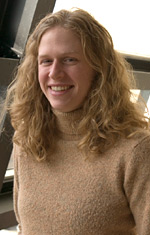Commentary: Chelsea Wald
|
Blogging a year in particle physics
In December 2004, the particle physics community started a bold and somewhat unusual initiative. Called Quantum Diaries, it was to be a Web site weaving together the online diaries of dozens of physicists from around the world for the World Year of Physics. Through the popular technology of Weblogging, or "blogging," Quantum Diaries was to offer the public a raw look at the everyday lives of real physicists.
This proposal struck me as both risky and courageous, especially since several news stories had come out around that time about bloggers who had been fired for what they had written. Here we were, specifically asking people to write about their professional lives. The potential payoff seemed worth the risks, however: We could bypass the usual and often stilted paths of communication between physicists and the public—lecture halls, the news media, and the publishing industry—and give anyone with an Internet connection direct access to some of the world’s scientific elite.
A year later, I can say that the risks were not borne out, and that the payoffs were greater than–and often different from–what we had hoped. The Web traffic statistics for Quantum Diaries were impressive, and readers communicated vigorously with some of the 33 diarists through the diary entries’ comment areas and through special online events like Career Week.
Readers commented that Quantum Diaries showed them "what kind of person devotes their life to physics." The Diaries demonstrated that while physicists are intense about their work, they are also people with families, hobbies, opinions, and feelings, unlike the "disconnected-from-society" stereotype. As one reader observed, "physicists are normal humans." Another reader wrote that Quantum Diaries helped him decide to pursue a career in physics: "I needed to see the kind of physicist I wanted to be like."
The day-to-day of being a scientist–full of tedium and failure but sprinkled with eureka moments—intrigued readers. They came to identify with the diarists, commiserating and celebrating with them. When one diarist expressed insecurity about a task she had taken on, a reader wrote, "Never sell yourself short, for this is pretty much the job of everyone else."
The media also immediately took to Quantum Diaries. Science, Voice of America, American Scientist, and the Chronicle of Higher Education wrote about the site. Local newspapers featured individual diarists. Reporters often asked diarists to comment on science news unrelated to Quantum Diaries. Two diarists–SLAC’s Caolionn O’Connell and Stephon Alexander–appeared in NOVA’s TV special on Einstein, in large part due to the enthusiasm they exuded on their blogs.
Finally, the diarists found themselves repeatedly pulled away from their computer screens and out into their communities, where they were greeted as local celebrities. Peter Steinberg of Brookhaven National Lab was invited to speak on a panel that followed a New York production of the play Einstein’s Gift. Sarah Phillips told William & Mary News that, at an open house at Jefferson Lab in Virginia, "One person actually told me that her daughter was trying to do better in her math class because my diary had inspired her...I have never had anyone squeal when they saw me before."
Sadly, blogging enjoys a mixed reputation in the physics community. Many potential physics bloggers worry that blogging could derail their careers because their colleagues consider it a narcissistic distraction from research. Some diarists reported being (mainly playfully) ridiculed by their peers, and a few expressed concerns that blogging would reflect poorly on them. Being part of an official effort helped the diarists justify their participation, but I imagine there are many physicists who have not started a blog because of their fears and lack of institutional support.
The success of Quantum Diaries and other physics blogs (like Cosmic Variance) means it’s time for the physics community to rethink its attitudes on blogging. Everybody benefits when good communicators take the time to have honest conversations with the public. Far from narcissistic, the Quantum Diarists were generous with their readers, who in turn came to trust and admire them. These relationships—with readers, the media, and local communities—will last long after Quantum Diaries’ end and have effects that we cannot predict. In my opinion, physics bloggers have earned their colleagues’ support and appreciation—and it’s time they got it.
In 2005, Chelsea Wald was editor of Quantum Diaries, which can be read at www.quantumdiaries.org. Quantum Diaries was supported by the InterAction Collaboration, a consortium of communicators from the world’s particle physics laboratories.
Click here to download the pdf version of this article.



